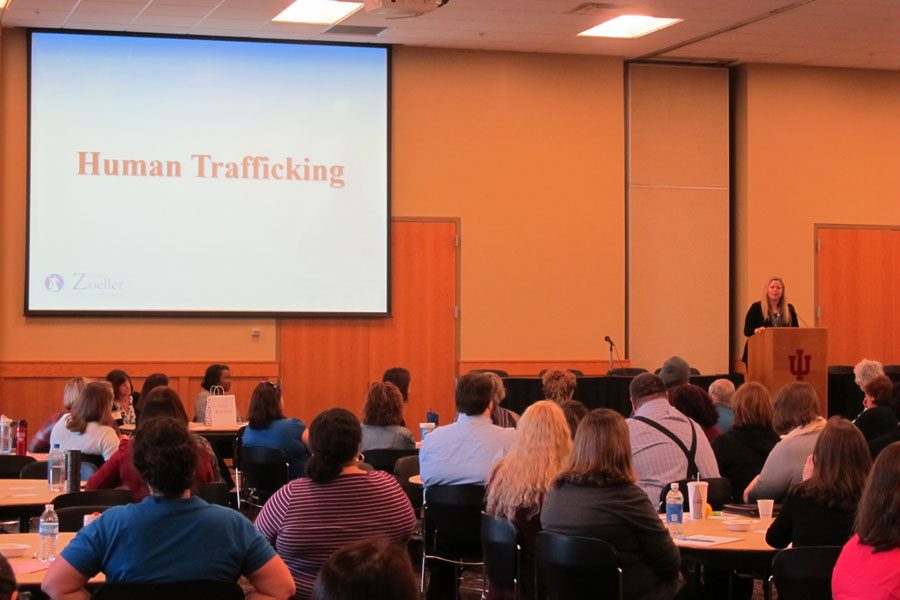IU Southeast hosts Southern Indiana Human Trafficking Awareness Conference
The audience listens to speakers talk about human trafficking and how it is affecting the community.
April 15, 2016
Local organizations came together to inform the general public of the severity and effects of human trafficking in Indiana and around the world.
IU Southeast held the first Southern Indiana Human Trafficking Awareness Conference Friday, April 1 from 9 a.m. to 4 p.m. in the Hoosier Room in University Center North.
The conference featured several guest speakers, including Jennifer Thurma, deputy Indiana attorney general in the Victim Services and Outreach Division; Robin Donaldson, chief operating officer at Indiana Youth Services Association; Darlene Bradley, senior special agent of the Department of Homeland Security; Yvonne Moore, coordinator of the Southern Indiana Human Trafficking Task Force; and others.
Thurma was the first speaker, and she discussed what’s being done to help human trafficking victims. She said groups and organizations, such as Lutherwood Residential Treatment Center, Indiana Department of Child Services, Juvenile Detention Alternatives Initiative and others, are trying to create programs to help those who have been trafficked and to prevent future trafficking.
Thurma said these groups have been creating new methods of screening. She said since some children don’t understand and don’t believe they are being trafficked, some of these groups believe there need to be new ways of screening children to be sure they are not being trafficked.
Next, Donaldson talked about the way trauma can alter the brain. Donaldson said a portion of the brain called the hippocampus, which is responsible for learning and memories, can shrink as a result of abuse. She said the hippocampus performance can be impacted as a result, which can lead to abused children having trouble when it comes to learning.
When Moore spoke, she said many human trafficking scenarios are happening online. She said popular social media sites, such as Kik, a messaging app, may be problematic, as well as apps that allow people to hide pictures inside fake apps that appear as other apps, such as a calculator, on a phone.
Moore said an app called Awareness Combats Trafficking can be used to help people recognize human trafficking. She said ACT teaches the user to look for warning signs so they can be better informed if they are worried someone is being trafficked. According to Moore’s presentation, the app can be downloaded on iOS or Android devices.
Additionally, Bradley talked about her experience being around those who have been trafficked.
Bradley told stories about past cases she was involved in. She said that in one of the cases, a state police officer found two children in the back seat of a car with two men. Bradley said the officer learned the children had been traded to a man to work off the family’s debt and were being transported by the two men in the car.
Bradley also discussed the importance of educating police officers and anyone who interacts with trafficking victims. She said the victims are told the officers will hurt them and not care about them, so it’s important for their first interactions with law enforcement to be caring.
“They need to be trained, we need to be trained,” Bradley said.
The conference also consisted of a panel discussion, and many of the speakers answered questions submitted by the audience.
Greg Zoeller, Indiana’s attorney general and co-chair of Indiana Protection for Abused and Trafficked Humans, serves on the National Association of Attorneys General. Zoeller said young girls who may have already been sexually abused or have run away from home are the most at risk for human trafficking.
“These children are being bought and sold for sex, and parts of society continue to tolerate this industry,” Zoeller said. “My office has worked to build education and awareness about the victims of trafficking so that they are provided the tools to recover and reenter society after this horrific trauma.”
Those interested in knowing more about human trafficking can send a message to IPATH on the organization’s Facebook page. Those who believe they have witnessed human trafficking can call the National Human Trafficking Resource Center at 1-888-373-7888.


